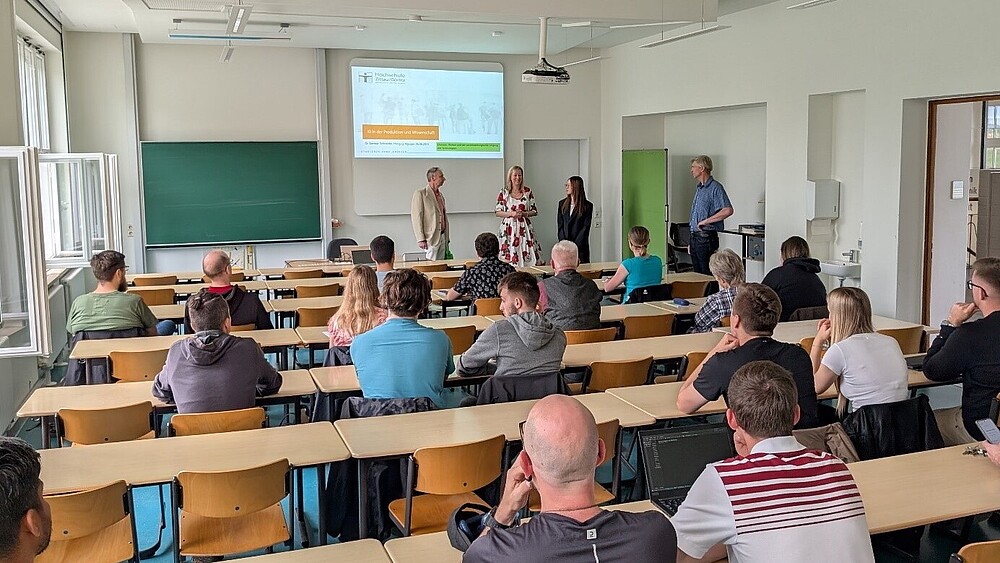And how do we deal with it responsibly? The SCO-TTi research team is organizing a lecture that is open to the university public and opens up interdisciplinary perspectives on AI, ethics and education.

How is artificial intelligence already shaping our science and industry today - and what responsibility does it entail? These questions were the focus of a public lecture at Zittau/Görlitz University of Applied Sciences, to which numerous scientists from various disciplines accepted the invitation. The event was dedicated to the current and future use of AI technologies in research and production. During the course of the event on June 6, 2025 at the Faculty of Business Administration and Engineering Management, it became clear how concretely and practically AI is already being used - whether in semiconductor production or in academic teaching and research.
Two speakers gave the presentation together: Dr. Germar Schneider, Senior Manager at Infineon Technologies Dresden GmbH & Co.KG (Infineon Dresden), and Ly Hong Nguyen, working student at Infineon Dresden, provided differentiated insights into industrial practice and university application scenarios.
After a welcome address by the Vice-Rector for Research, Transfer and Internationalization, Prof. Dr. rer. pol. Sophia Keil, the speakers introduced key concepts: Natural Language Processing, the productive use of Large Language Models to increase efficiency in industry and the opportunities and risks of using AI in research and teaching.
The use of AI in production is no longer a vision of the future - we use it specifically for quality assurance and process optimization. At the same time, we must learn to reflect carefully on these systems.
”AI is also changing how we research and learn. It is particularly important for students to understand how they can integrate these tools into their academic practice in a meaningful and responsible way," said Ly Hong Nguyen, emphasizing the importance of the perspective of young scientists.
Artificial intelligence is the engine of a new era that is fundamentally transforming teaching, research and production. Our responsibility is to help shape this change with courage and foresight - with a clear awareness of opportunities and risks and always guided by our ethical compass. The SCO-TTi research group is dedicated to designing human-centered working environments in which AI serves as a kind of superhero suit that gives people the freedom to focus on creative and innovative tasks and thus generate new ideas and solutions instead of being occupied with repetitive tasks.
”"The rapid development of artificial intelligence requires not only technological adaptations, but above all continuous educational processes. In order to use the potential of AI responsibly and competently, we need qualified specialists who understand both the technical basics and can reflect on the social implications. Sound education and training is the key to understanding AI not just as a tool, but as an integral part of a sustainable digital transformation - in science as well as in industry," explains Prof. Dr. Uwe Wendt, Professor of Business Administration, in particular Information Systems, member of the SCO-TTi research group.
The focus was also on ethical issues - such as how creativity can be preserved and how students can be empowered to handle AI technologies with care. The great response from various departments at the university made it clear how high the interest in this topic is.
Many thanks to the speakers Dr Germar Schneider and Ly Hong Nguyen, the organizational team led by Daniel Winkler, Ulrike Schmidt and Steffen Zücker for their dedicated preparation and support of the event, as well as the Dean of the Faculty of Business Administration and Engineering Management, Prof. Dr Sebastian Zips.
This work is supported by a cooperation co-financed by Infineon Technologies Dresden GmbH & Co. KG as part of the funded project "MEGAFAB-DD".